Onions are a common staple in many households, but when it comes to feline companions, they pose a severe threat. The toxicity of onions to cats is a matter that necessitates attention and caution from pet owners.
Understanding the intricacies of why cats cannot consume onions is not only essential but could be a life-saving piece of information. Delving into the reasons behind this prohibition sheds light on the potential dangers lurking in seemingly harmless foods.
By unraveling the complexities of this topic, a clearer picture emerges, urging pet owners to take proactive measures in safeguarding their cats' well-being.
Key Takeaways
- Onions contain a toxin harmful to cats.
- Cats are more susceptible to onion toxicity than dogs.
- Immediate veterinary care is crucial for onion ingestion.
- Avoid feeding cats any Allium family foods.
Onion Toxicity in Cats
Onion toxicity poses a significant risk to cats due to the presence of n-propyl disulfide, a toxic compound that can have detrimental effects on a cat's health and well-being. This compound, found in all varieties of onions including cooked, raw, powdered, or freeze-dried forms, can lead to oxidative damage of red blood cells and result in a condition known as Heinz body anemia in felines.
Cats lack the necessary enzymes to safely digest and metabolize onions, making them particularly susceptible to onion poisoning compared to other animals like dogs. It is crucial for cat owners to be aware of this danger and ensure that onions and related products are kept far away from their feline companions to prevent any accidental ingestion and subsequent health complications.
Susceptibility of Cats to Onions
Cats exhibit a heightened vulnerability to the toxic effects of onions compared to many other common household pets. This susceptibility is due to their inability to metabolize certain compounds found in onions, leading to harmful effects on their red blood cells. To illustrate this further, here is a table showcasing the key differences in susceptibility to onion toxicity between cats and dogs:
| Susceptibility | Cats | Dogs |
|---|---|---|
| Metabolism | Limited ability | Efficient |
| Red Blood Cells | Heinz body formation | Less prone |
| Symptoms | Severe toxicity | Mild symptoms |
| Toxic Threshold | Lower | Higher |
Understanding these differences emphasizes the importance of keeping onions and related foods away from feline companions to ensure their well-being.
Allium Family Foods and Cats
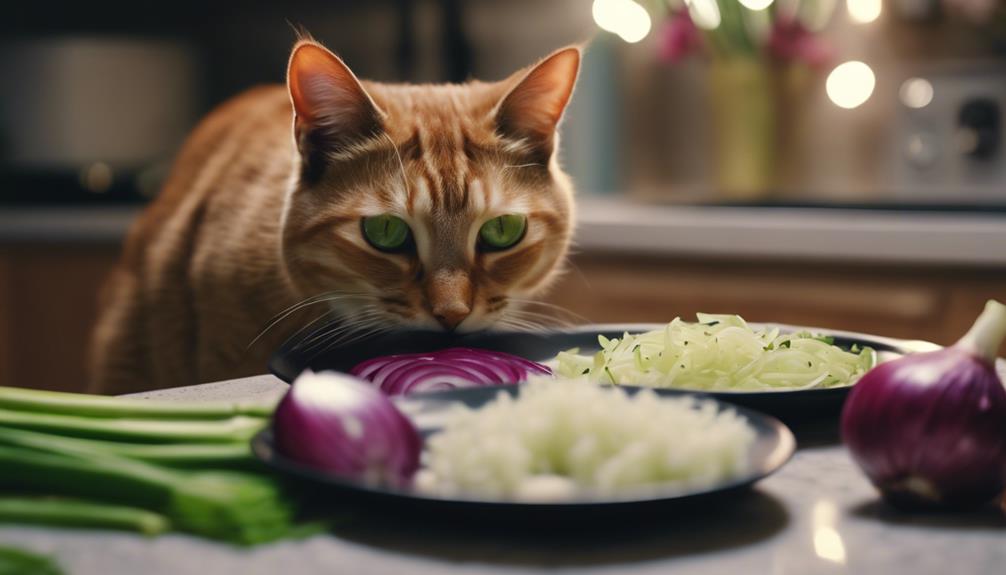
With the heightened vulnerability of cats to the toxic effects of onions compared to dogs, it is essential to understand the potential risks associated with other Allium family foods in feline companions. The Allium family includes chives, leeks, scallions, shallots, and garlic, which can also pose risks to cats due to their similar toxic components.
Cats should avoid all forms of these foods, including powdered or freeze-dried onion spices, as the concentration of the onion products can affect the level of toxicity. It is crucial for cat owners to be mindful of the ingredients present in their pet's food and treats to prevent accidental ingestion of these harmful substances.
Consulting with a veterinarian for guidance on safe dietary options for cats is recommended to ensure their well-being and health.
Harmful Effects of Onion Spices
The potential dangers of onion spices in feline companions' diets underscore the importance of understanding the specific harmful effects these seasonings can have on cats.
Onion spices, commonly used in various dishes, contain compounds like n-propyl disulfide that are toxic to cats.
Even small amounts of onion spices, whether powdered or freeze-dried, can lead to severe health issues in cats.
Consumption of onion spices can result in symptoms such as gastrointestinal distress, red urine, pale gums, yellowed skin, and weakness.
It is crucial for cat owners to be vigilant about the ingredients in their pet's food and avoid feeding cats any dishes seasoned with onion spices to prevent potential poisoning and ensure the well-being of their furry companions.
Concentration Impact on Toxicity
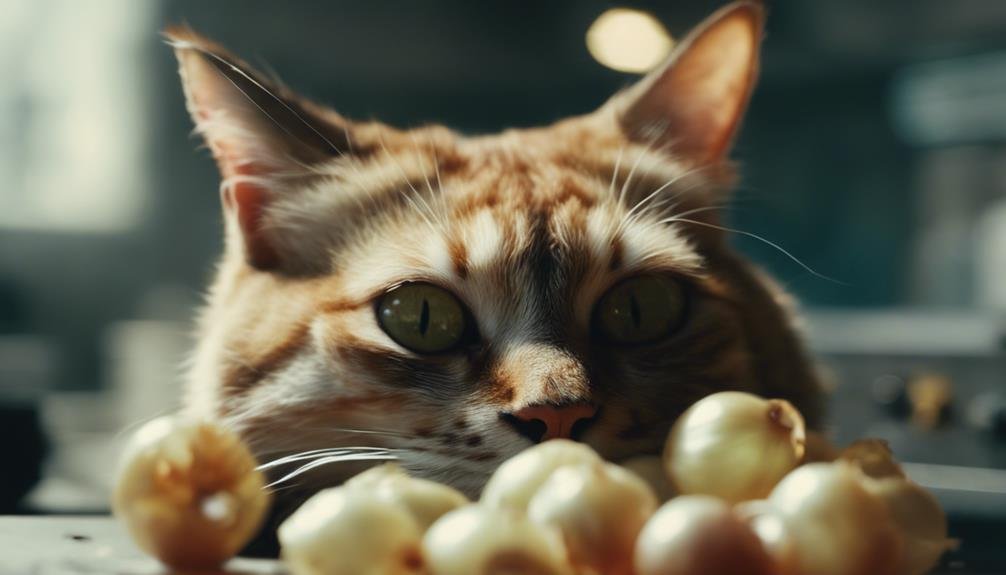
When considering the toxicity of onions to feline companions, the impact of concentration on the severity of potential health risks becomes a critical factor for pet owners to acknowledge. Even small amounts of onion can pose a threat to cats due to their inability to metabolize certain compounds present in the vegetable.
The concentration of the toxic substance, n-propyl disulfide, in onions increases the risk of poisoning in cats. Pet owners must be vigilant about checking ingredient lists for onion content, as even trace amounts can lead to adverse effects.
Understanding the relationship between onion concentration and toxicity is vital in safeguarding the well-being of our beloved feline friends.
Symptoms of Onion Poisoning
Symptoms indicative of onion poisoning in cats manifest as gastrointestinal distress, potentially leading to more severe health complications if left untreated. These symptoms can be distressing to witness for cat owners. It is crucial to recognize the signs of onion toxicity in cats to seek immediate veterinary attention.
The following are key symptoms of onion poisoning in cats:
- Vomiting and diarrhea
- Lethargy and weakness
- Oral irritation and drooling
If you notice any of these symptoms in your cat, it is essential to consult a veterinarian promptly. Early intervention can prevent the progression of onion poisoning and improve the chances of a successful recovery for your furry friend.
Delayed Symptom Manifestation
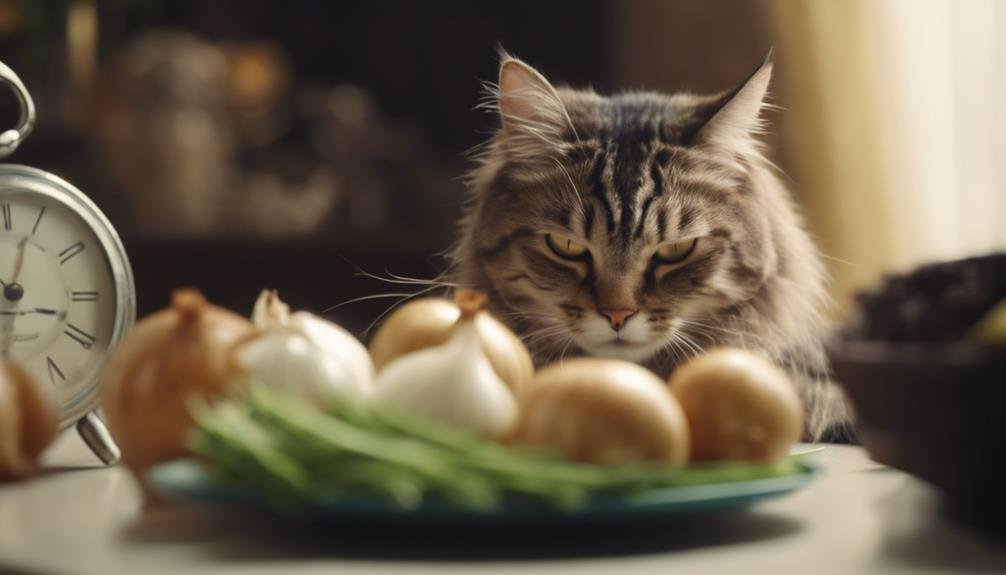
Recognizing the potential danger of onion poisoning in cats, understanding the delayed manifestation of symptoms becomes crucial for timely veterinary intervention and optimal care.
Despite the ingestion of onions, cats may not exhibit immediate signs of toxicity. This delayed onset of symptoms can mislead cat owners into thinking their pet is unaffected. However, up to five days post-ingestion, cats may display serious indicators such as red urine, pale gums, yellowed skin, and weakness.
Therefore, close monitoring of the feline companion for any unusual behaviors or physical changes is essential even after an onion exposure. Seeking veterinary assistance promptly upon suspecting onion ingestion is imperative to ensure the well-being of the cat.
Initial Signs of Poisoning
Upon ingestion of onions, cats may exhibit subtle initial signs of poisoning that necessitate prompt veterinary evaluation to ensure timely intervention and appropriate care. Cats affected by onion toxicity may initially show the following signs:
- Lethargy and weakness
- Decreased appetite
- Vomiting or diarrhea
These early symptoms could be mistaken for minor illnesses or temporary discomfort, highlighting the importance of being vigilant about any potential onion exposure.
Seeking professional veterinary assistance promptly is crucial in detecting and managing onion poisoning in cats before more severe symptoms develop. Owners must remain attentive to their cat's behavior and health, as early recognition and treatment can significantly impact the outcome of onion toxicity.
Additional Toxicity Symptoms
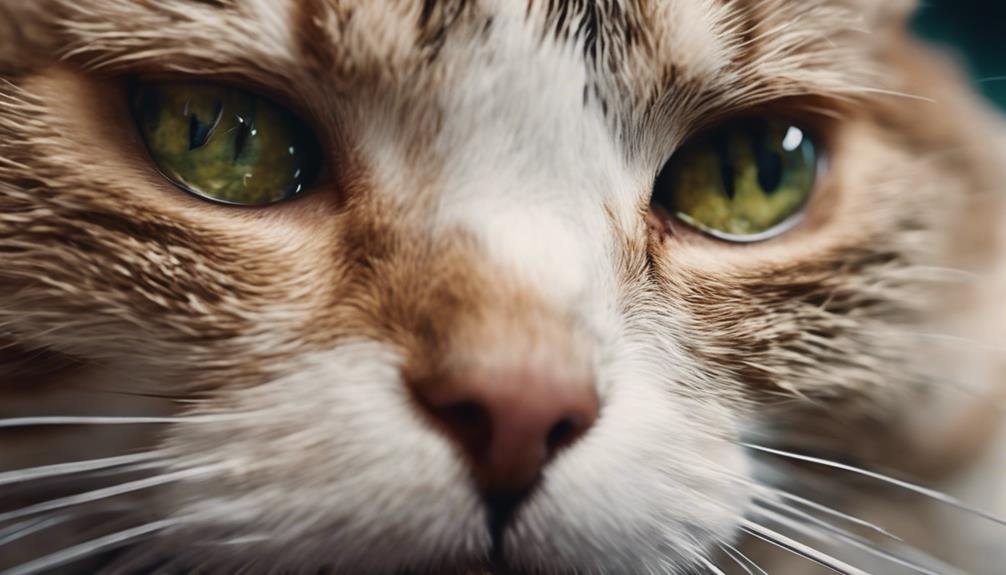
In cats affected by onion toxicity, the manifestation of additional symptoms beyond the initial signs can vary in severity and may include distinctive physiological changes. Alongside gastrointestinal distress, affected cats may exhibit red urine, pale gums, yellowed skin, and weakness, which can arise up to five days post-ingestion.
These symptoms indicate a progression of the toxic effects within the feline's body and require prompt veterinary attention. Observing these distinctive physiological changes serves as crucial indicators of the severity of onion poisoning and underscores the importance of seeking professional medical intervention.
Recognizing and addressing these additional toxicity symptoms promptly can significantly impact the cat's prognosis and aid in mitigating further harm caused by onion ingestion.
Treatment for Onion Ingestion
Cats that have ingested onions require immediate veterinary intervention to address the potential toxicity and prevent further harm. Once at the veterinary clinic, treatment for onion ingestion may include:
- Administration of activated charcoal to absorb any remaining toxins.
- Intravenous fluids to support kidney function and promote toxin elimination.
- Monitoring of blood parameters to assess the cat's overall health and response to treatment.
It is crucial to act promptly and seek professional help to ensure the best possible outcome for a cat that has consumed onions. Veterinary care can provide the necessary support and treatment to counteract the effects of onion toxicity and safeguard your feline companion's well-being.
Urgent Veterinary Evaluation
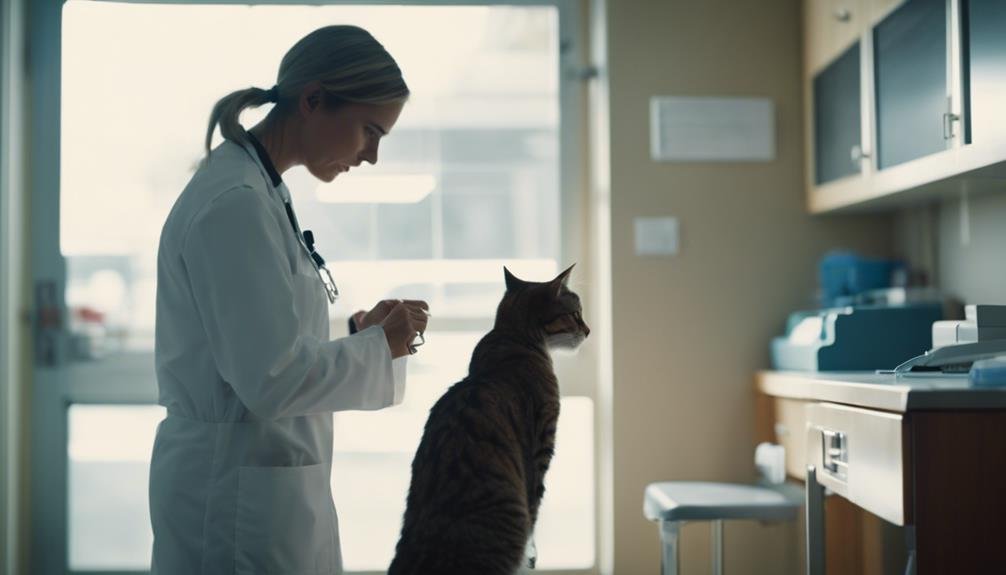
Seeking immediate veterinary assessment is imperative when a cat has potentially ingested onions to ensure prompt diagnosis and appropriate treatment. Cats are highly sensitive to onion toxicity, and quick intervention is crucial. If you suspect your cat has consumed onions, do not delay seeking professional help.
Urgent veterinary evaluation can help determine the severity of the situation and guide necessary actions. Veterinarians may recommend inducing vomiting to remove any remaining onion from the cat's system. Additionally, blood work and urinalysis are vital in diagnosing onion toxicity accurately. Providing your vet with a detailed history of the cat's exposure will assist in tailoring the treatment plan to your feline companion's specific needs.
Your swift action can make a significant difference in your cat's health and recovery.
Diagnostic Tests for Onion Toxicity
Upon suspecting onion ingestion in a cat, diagnostic tests play a crucial role in confirming and evaluating the extent of onion toxicity. These tests are essential for guiding appropriate treatment decisions and ensuring the well-being of the feline companion.
To effectively diagnose onion toxicity in cats, the following diagnostic measures are commonly employed:
- Blood work: Assessing specific markers in the blood can reveal the presence and severity of onion toxicity.
- Urinalysis: Analyzing the cat's urine can provide additional insights into the impact of onion ingestion on the body.
- Imaging studies: In some cases, imaging techniques like X-rays may be used to evaluate any potential damage caused by onion toxicity.
These diagnostic tests collectively aid veterinarians in formulating a comprehensive treatment plan tailored to the cat's condition.
Safe Foods for Cats
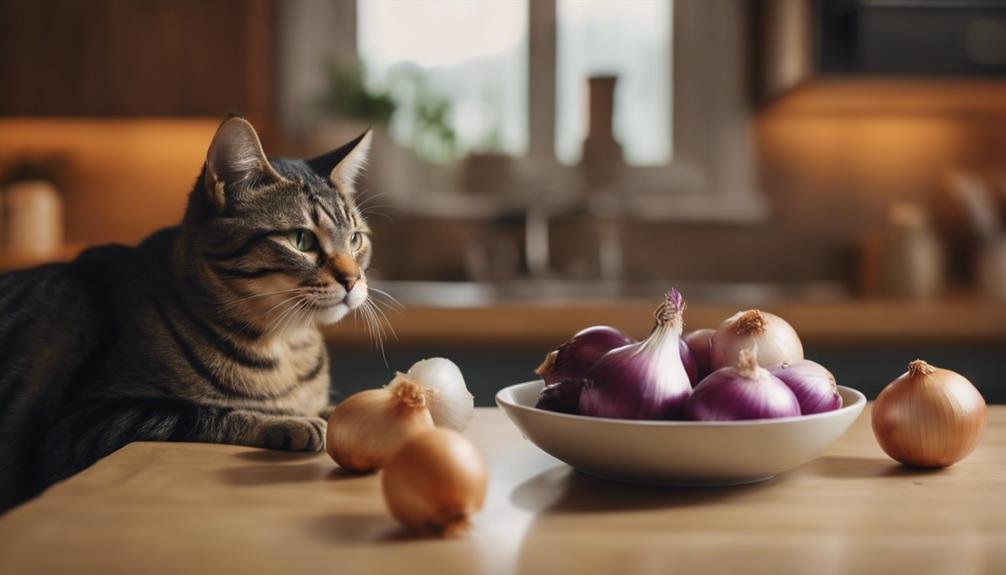
When considering the well-being of feline companions, it is essential to be mindful of the safe foods that can be incorporated into their diet. Below is a table outlining some safe human foods and practices for cats:
| Safe Foods for Cats | Description | Benefits |
|---|---|---|
| Cooked Meat | Unseasoned meat provides essential animal protein | Supports muscle growth and overall health |
| Fish (in moderation) | Rich in omega-3 fatty acids beneficial for cats | Promotes healthy skin and coat |
| Eggs | Excellent source of protein for cats | Aids in maintaining a strong immune system |
| Pumpkin | High in fiber and can aid in digestion | Helps prevent constipation and regulate bowel movements |
| Blueberries | Antioxidant-rich and low in calories | Offers a tasty and healthy treat option for cats |
Pet-Friendly Plant Options
Considering the safety and well-being of cats in a household environment, it is important to explore pet-friendly plant options to ensure a conducive and non-toxic living space for feline companions.
- Spider Plant: Known for being safe for cats and easy to care for.
- Parlor Palm: Non-toxic to cats and adds a touch of greenery to indoor spaces.
- African Violet: A colorful and safe option that cats can coexist with peacefully.
These plants not only enhance the aesthetic appeal of your home but also provide a safe environment for your beloved feline friends. By incorporating these pet-friendly plants, you can create a harmonious and healthy living space for both you and your cat.
Emergency Care for Onion Poisoning
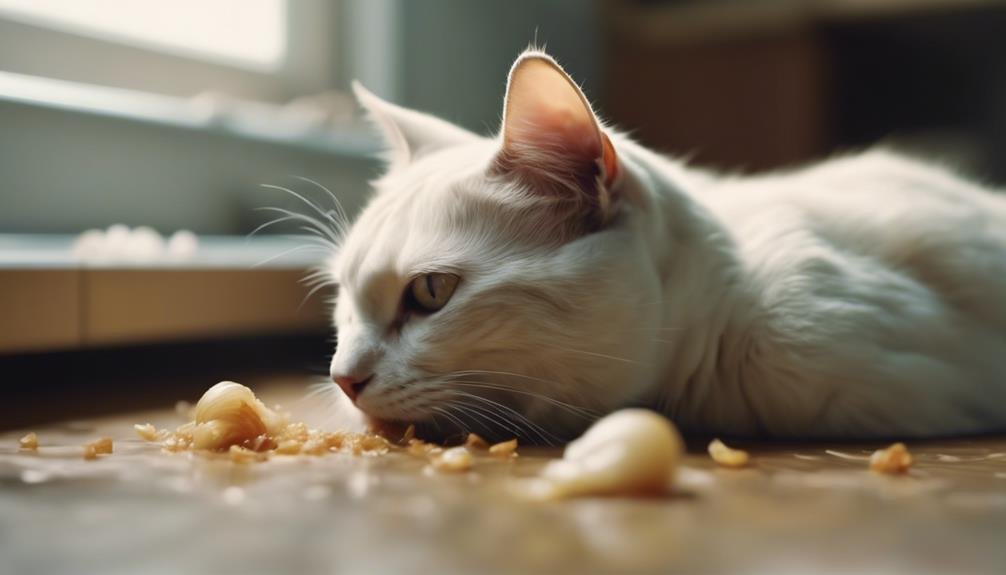
In the event of onion poisoning in cats, prompt and appropriate emergency veterinary care is crucial to ensure the well-being and recovery of the affected feline. If you suspect your cat has ingested onions, seek immediate professional help.
Veterinarians may induce vomiting to remove the toxins or provide supportive care such as intravenous fluids and medications to manage symptoms. Blood tests are often necessary to confirm onion toxicity and guide treatment.
Conclusion
In conclusion, onions are like hidden daggers in the diet of cats, posing a grave threat to their health and well-being.
Just as a snake's venom can silently harm its prey, the toxic compounds in onions can silently wreak havoc on a cat's body.
It is crucial for pet owners to be vigilant and proactive in protecting their feline companions from this dangerous ingredient, ensuring a safe and nourishing environment for their beloved pets.




